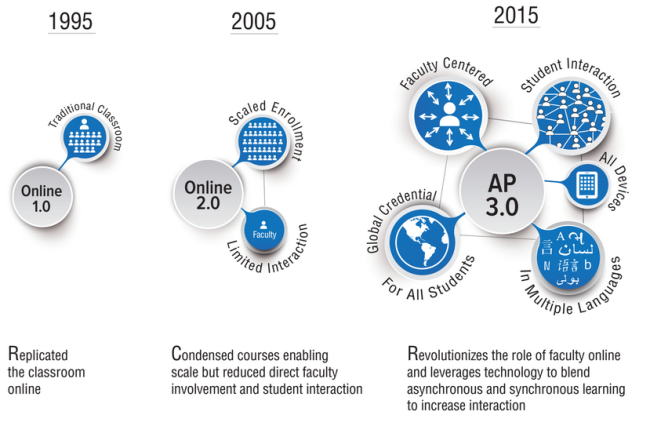You have /5 articles left.
Sign up for a free account or log in.

How Academic Partnerships visualizes the three major versions of online education.
Academic Partnerships
The online “enabler” company Academic Partnerships plans to share tuition revenue with faculty members at partnering universities as the company prepares a major update of its online education platform.
The revenue-sharing model is part of Academic Partnerships 3.0, the updated online education platform the company announced today. The platform supports asynchronous content, which online students can consume on their own time, but it will be updated this fall to support what CEO Randy Best described as blended learning in a fully online setting that is made available to an international audience.
Academic Partnerships, like other enablers, helps colleges and universities with services associated with online education, such as curriculum development, enrollment management and marketing, and provides the software platform to offer courses online. Institutions often agree to share tuition revenue in return for those services to take their programs online. In some cases, the companies cover most or all of the costs associated with launching the programs, then recoup the initial costs as students begin to enroll.
The model proposed by Academic Partnerships throws another party -- faculty members -- into the mix. Since the introduction of synchronous content means faculty members will likely spend more time on the courses they teach online, the company is giving them a cut of the tuition revenue.
Initially, faculty members who choose to host live online sessions can earn up to 3 percent of the tuition revenue, which Best said he expects will cost the company “several million dollars annually" in forgone revenue. The money will come out of the company’s share, he said -- not the university’s.
Normally, revenue-sharing agreements start with the university and the enabler splitting the revenue, with the university’s share growing as enrollment increases. The university also decides how its share should be distributed. For example, the revenue may be used to create more online courses, fund on-site programs or find its way to departments based on how many credit hours they teach online.
Best said Academic Partnerships won’t pay faculty members for hosting live sessions directly. The company will work with its partners to determine how best to distribute the money -- negotiations that are expected to take several months, he said.
“This type of activity is highly desirable, and we want to properly reward and see that the professor is compensated,” Best said. “We know universities’ budgets are tight, and we believe that the enhancement that is gained by participating [in live online sessions] is so significant that we believe it’s our responsibility to compensate.”
Building on 'Specializations'
The version number in Academic Partnerships 3.0 refers to an abridged history of online education, Best said.
The first phase, which peaked in the mid-1990s, involved the first few universities experimenting with putting courses online. In the second phase, which took place about a decade ago, institutions realized they could increase enrollment by condensing semesterlong courses into a few weeks -- though those increases came at the expense of student-instructor interaction.
In the third phase, Best said, Academic Partnerships will focus on making online education available to students “regardless of location, time and language.” That includes prioritizing interaction, translating courses for non-English speakers and increasing compatibility with more devices, according to the announcement.
“We believe for schools to prosper in the future, they need to seriously consider international students,” Best said. But instead of helping institutions “import” students to study in the U.S., Academic Partnerships has positioned itself to let colleges and universities export courses to students outside the U.S., he said.
With the updates rolling out this fall, Academic Partnerships will offer translation services to partner universities that wish to offer degree programs to non-English-speaking students. If a university wants to offer an engineering degree in Mandarin, for example, Academic Partnerships will provide translation services. Those services, along with the software updates, will come at no extra cost to partner universities, Best said.
The idea for the third major version of Academic Partnerships’s platform became possible from a technological standpoint about six months ago, Best said. The company has partnered with a handful of providers that supply the technology being introduced this fall, including the videoconferencing software, but Best declined to disclose the names at the moment.
Best said Academic Partnerships is responding to research (including a survey by Inside Higher Ed) that suggests interaction between students and instructors is a hallmark of high-quality online education. The company’s fall update therefore includes videoconferencing software that will let faculty members choose to include live online sessions in their courses. For students who can’t fit them into their schedules, the sessions will be recorded and archived.
“We understand that most people participating online are working adults and can’t come to campus,” Best said in an interview. “That doesn’t mean the benefits of interactions have diminished.”
Many of the details in today’s announcement can be found in Specializations, a program Academic Partnerships launched last year. Specializations are bundles of certificate-granting courses created by universities in English-speaking countries that are translated and offered by universities in countries such as China, India and Mexico. The company announced its first Specializations partners last month.
The 3.0 announcement “emerged from our efforts to create the globalization of our programs,” Best said.




